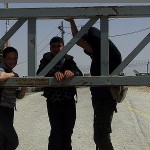
Filmed and produced by Cat Rabenstine for the Christian Peacemaker Teams in Palestine.
Life in the West Bank

Filmed and produced by Cat Rabenstine for the Christian Peacemaker Teams in Palestine.

CPTnet 17 December 2010
A newsletter written by members of the Christian Peacemaker Teams.
SOUTH HEBRON HILLS  On 14 December 2010, the Israeli military demolished three water cisterns and two wells in the arid and hilly Khashem Ad Daraj/Hathaleen region, about twenty-six km southeast of Hebron/al-Khalil on Tuesday. The military gave no reason for the destruction of the wells and cisterns.
The demolitions follow a pattern of destruction of Palestinian property by the Israeli military in the Oslo Accords-defined Area C.
The Israeli army failed to deliver demolition orders to the residents of the villages in the area and instead left them under a stone two days earlier for the residents to find.
The demolished cisterns and wells supplied drinking water to the villagers as well as their sheep and goats, the primary sources of food and income for the villages in the area.
The wells were up to 300 meters deep and over seventy years old, pre-dating the 1967 occupation of the Palestinian Territories. The Israeli military claims that it does not destroy structures created before 1967.
The region receives an average yearly rainfall of between 150-250 mm.*
*Applied Research Institute, Jerusalem & United Nations World Food Programme. February 2010 Report.

CPTnet Volume 36, Issue 3
A newsletter written by members of the Christian Peacemaker Teams
This autumn, a local businessman alerted three CPTers to the presence of a group of soldiers outside the Ibrahimi School, located in the heart of the Old City.
Upon arrival, the school principal informed CPT that a settler boy, around seven years old, had accused two Palestinian boys from the Ibrahimi School of throwing a rock at him.  Soldiers wanted to enter the school with the settler child to identify and arrest the Palestinian boys, and the school principal responded by saying they would first need to get
permission from the Palestinian Minister of Education.
Over a period of three hours, fifty Israeli soldiers, twenty settlers and Israeli police gathered outside the school. When the Palestinian Ministry of Education told the soldiers that they could not enter the school, the Israeli army disregarded his decision and entered the school with the settler boy in tow.
Two Palestinian boys under the age of eighteen were arrested in front of their peers and taken to the local police station. The Israeli army and police informed the Minister of Education that these arrests were necessary for “maintaining the peace,” because the group of settlers gathered outside the school had threatened to remain and harass the school
children if the police did not arrest the Palestinian boys.
Over the years, people on the Hebron team have witnessed settler children attack Palestinian children many times, and to the best of our knowledge, no police officer has ever taken a Palestinian child into an Israeli school to point out his/her attackers.  Indeed, when adult Palestinians and internationals provide documentation of settler children attacking Palestinian children and adults, police and soldiers usually dismiss them rudely.
The Ibrahimi School incident not only shows the lack of impartiality on the part of the police, but also that settler accusations supersede preserving the educational environment of Palestinian children.
The entry of soldiers into educational institutions signifies to children that schools are not safe places for them, thus creating further barriers to education.
The young settler boy that made the rock throwing accusation was prompted by his father and other adult settlers to demand entry into the Ibrahimi School during school hours. Settler adults brought a number of settler children with them to the school and refused to obey the soldiers instructions for children to leave the scene.
Children need safe environments where they can learn and grow. Unfortunately, what CPT observes here in Al-Khalil is that children, both Palestinian and Israeli, are not being brought up in a spirit of love or respect for others.
The Israeli authorities in this area are not preparing children for a life of peace, tolerance, and equality — a life that all children deserve.
For footage of the Ibrahimi school incident, click here

CPTnet Digest
A newsletter written by members of the Christian Peacemaker Teams
5 November 2010
SOUTH HEBRON HILLS: Israeli Army arrests young Palestinian man in South Hebron Hills
[Note: According to the Fourth Geneva Convention, the International Court of
Justice, and several United Nations resolutions, all Israeli settlements and
outposts in the Occupied Palestinian Territories are illegal. Most
settlement outposts, including Havat Ma’on (Hill 833), are illegal under
Israeli law.]
On the morning of Saturday, 30 October 2010, around 10:30 a.m., Israeli
soldiers arrested a young Palestinian man from the village of Tuba, in the
South Hebron Hills, who had been filming Israeli soldiers chasing two young
Palestinian shepherds from Tuba.
The two shepherds, accompanied by internationals of Operation Dove (the
nonviolent corps of the Italian organization Community Pope John XXIII), were
watching their flocks in the Umm Zeitouna area, on private Palestinian land.
Around 10:00 a.m., a group of Israeli activists from Ta’ayush joined the
internationals accompanying the shepherds. After about ten minutes, three
military jeeps and two armored cars from Israeli army, the DCO (District
Coordination Office of the Israeli military) and Israeli police arrived,
surrounding the whole area. After a few minutes, Israeli soldiers came down
from the hilltop into the valley, chasing the two Palestinian shepherds, who
ran quickly toward their village.
Israeli activists and internationals tried to speak with soldiers, explaining, that the two shepherds were on Palestinian-owned land and, according to Israeli law, it is illegal to prevent Palestinians from accessing their land.
Nevertheless, the Israeli army continued chasing shepherds until they reached Tuba village as the young Palestinian man, who was working for Israeli human rights organization B’tselem, videotaped the action.
Soldiers then surrounded the Palestinian, detained him, and forced him to follow them to the Israeli-only bypass road, preventing him from answering his cell phone. They then took the young man to a military base close to the nearby Susiya settlement, detaining him for five hours.
After his release, the Palestinian told internationals he was blindfolded and handcuffed for a long time, and refused permission to make phone calls.  None of the soldiers were able to speak Arabic and they were not willing to speak with him in English.
Operation Dove and Christian Peacemaker Teams have maintained an international presence in At-Tuwani and South Hebron Hills since 2004.

CPTnet Digest, Volume 35, Issue 1
A newsletter written by members of the Christian Peacemaker Teams
29 October 2010
AL-KHALIL (HEBRON): Shepherd made homeless, livelihood threatened, son in prison.
On Monday 11 October, at 8.00 a.m. the Israeli military arrived at the home
of Noah al-Rajabi in Bani Naim without warning and destroyed the family’s
water cistern, tent, and a small wooden structure family members used for
cooking and storage.
Al-Rajabi told CPTers, who visited after the incident, that soldiers kicked
and beat some of the animals and that one pregnant ewe aborted. Â When his
fourteen-year-old son objected to their actions, soldiers arrested him,
accusing him of “obstructing the military” and scratching a soldier’s
face.
Ten weeks earlier, the Israeli military demolished al-Rajabi’s house. His
wife and the younger of his seven children now live in two rented rooms in
Hebron. Al-Rajabi and his oldest son remained in a tent supplied by the Red
Cross, so that they could continue working with his flock.
CPTers met al-Rajabi in Hebron on 12 October. He did not know where his son
was being held, or where he could get water for his animals. They
accompanied him to three Israeli police stations. The only information
Israeli police gave them was that his son was being held in Ofer military
prison. They refused to accept a complaint against the Israeli soldiers for
their behaviour.
CPTers also visited Al-Rajabi’s rented accommodation in Hebron where they
met his wife and some of his other children. “Please bring my son
home,” his wife pleaded with them.
Al-Rajabi’s brother has been watching his sheep and goats, and has moved
them to another hillside where there is water. Agencies in Hebron are
trying to reconnect Noah’s water supply, but the cistern will have to be
rebuilt, and will run the risk of demolition in the future.
For further information on the imprisonment of Palestinian minors by the
Israeli military, please refer to the annual reports of Defence for Children International (Palestine).

CPTnet Digest, Volume 33, Issue 11
A newsletter written by members of the Christian Peacemaker Teams
20 September 2010
The regular Saturday movement, “Open Shuhada Street,” changed tactics on 21 August 2010. Since the police had threatened two of the organizers with large fines and a possible ten-year imprisonment if the demonstrations continued, the organizing group felt it better to use a new approach during the remainder of Ramadan.
The activists used the day to build relationships in the Old City by delivering certificates of appreciation to the shopkeepers for continuing to open their shops every day in the midst of this Occupation. Led by an energetic group of Israeli activist drummers and rhythm instruments, approximately seventy-five Israeli, Palestinian and international activists marched through the Old City, Hebron. Activists distributed the certificates and flyers to all the shopkeepers, encouraging them to continue their resistance to the Occupation.
The police had been trying to get the shopkeepers to close their stores, telling them that their shops were in danger of being welded shut like the three shops in Bab il Baledeyya at the entrance to the Old City.